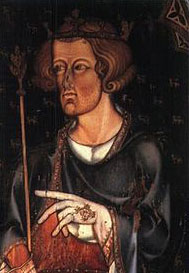Edward I (17 June 1239 – 7 July 1307)
Edward the First, also known as Edward Longshanks, was King of England from 1272 to 1307. Edward I was a shrewd political calculator with impressive physical and mental capabilities. He oversaw the unification of England and Wales and defeat of baron rebellions. He left a stronger government and monarchy, but his ruthlessness also led to many crimes against defeated opponents.

Edward was born on 18 June 1239 to King Henry III and Eleanor of Provence. He was of the Plantagenet House. When he was 15, he was married to Eleanor the half-sister of King Alfonso X of Castile. This was a politically expedient marriage to deal with the threat of Castille invading English province of Gascony.
In 1259, the Barons rebelled against his father, Henry III, due to the perceived abuses of his reign. Initially, Edward supported the Provisions of Oxford which would give greater rights to the Barons. Along with the Magna Carta, the Provisions of Oxford was considered to be the first written English constitution. The provisions of Oxford forced Henry III to accept a new form of government in which power was placed in the hands of a council of twenty-four members, twelve selected by the crown, twelve by the barons.
However, in 1261, Henry III overthrew these provisions and the barons rebelled again. By this time, Edward had reconciled with his father and he helped to defeat the baron rebellion. But, during the battle of Lewes, Edward was captured by the rebel barons and placed under house arrest at Hereford Castle by his uncle Simon de Montfort. Yet through his own resourcefulness, Edward was able to escape. When a dealer brought horses to the castle, Edward asked the guards to have a go at riding the horses. The guards agreed and after a display of his horsemanship, Edward jumped on the last fresh horse and galloped away to freedom.
In 1265, Edward was part of the forces that defeated Simon de Montfort at the battle of Evesham; this extinguished the rebellion and cemented the rule of Henry III. After the end of the baron rebellion, Edward went on a crusade to the Holy Land, however, the crusade was relatively insignificant and demoralised he returned home to England. By the time he returned to England in 1274, his father Henry III had died, leaving Edward to be crowned as King at Westminster.
Personal capacities
Unlike his father, Henry who had left the state virtually bankrupt, Edward proved an able administrator. He spent his early years as king reforming the law on regulating criminal and property law. He helped strengthen the government and parliament and removed some of the abuses of power and patronage.
Edward was a man of impressive physical stature and very tall for the age. His cunning was also allied to a very short temper. He was notorious for boxing the ears of his children when they displeased him. He was widely feared, but his commanding presence gained the respect of those looking for strong leadership. He attended religious worship regularly and fulfilled the expected religious duties of the day.
Rebellions in Wales
However, during this period there were frequent rebellions in Wales against English rule. After the second rebellion of 1282-83, Edward took his army to Wales in order to conquer and pacify Wales once and for all. He was successful militarily and built a series of forts and castles across the north-west of Wales to help strengthen the English position in Wales. This action cemented Wales within the British government. In 1284, one account states who Edward bought his pregnant wife Eleanor (with whom he was deeply attached) to Caernarfon Castle and Edward mocked the Welsh that he would ‘give them a prince that speaks not a word of Welsh.’ However, some say, far from being insulted, the Welsh enjoyed Edward’s joke and later a tradition developed that the heir to the English throne would be called the Prince of Wales.
Later Edward switched his attention to Scotland. He claimed the right to have ultimate power in Scotland. But, led by William Wallace and Robert Bruce, Edward was never able to wipe out Scottish resistance. The Scottish Wars continued after his death.
The continual fighting at home and abroad was very expensive leading to a shortage of funds. Edward responded by putting up taxes which proved very unpopular, and Edward had to meet with opposition from those paying taxes.
Edward I was a tall (6’2″) imposing man who cemented the unity of Britain. He played an important role in restoring the power and importance of the King. However, he also helped establish Parliament as a permanent institution, this proved important for the future development of the British state. He also made important changes in law and order. Cementing the use of legal statutes to defend property and the law.
He has been criticised for the expulsion of Jews from England in 1290. After receiving a subsidy from parliament, Edward agreed to expel some 3,000 Jews living in England – many of whom were killed in the wave of anti-Jewish feeling that was unleashed. Edward personally profited from the Jewish houses that were claimed by the state.
Also, even by medieval standards, his treatment of the Welsh and Scottish was brutal. He was dismissive of the Irish, saying in scorn.
“The laws the Irish use are detestable to God, and so contrary to all law that they ought not to be deemed law.” Speech (1277) Marc Morris, A Great and Terrible King: Edward I and the Forging of Britain (2009), p. 220
A contemporary account from “The song of Lewes c. 1264” reveals how he was viewed by his own people.
“Perhaps he will be rightly called a leopard. If we divide the name it becomes lion and pard; lion, because we saw that he was not slow to attack the strongest places, fearing the onslaught of none. … A lion by pride and fierceness, he is by inconstancy and changeableness a pard, changing his word and promise, cloaking himself by pleasant speech.”
Citation: Pettinger, Tejvan. “Biography of King Edward I”, Oxford, UK. www.biographyonline.net. Published 27/02/2012. Last updated 11 February 2020.
Related pages


